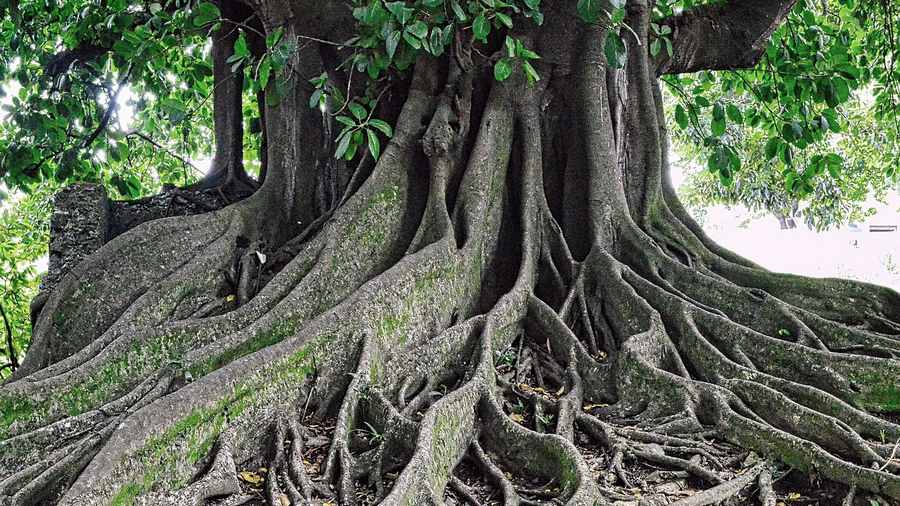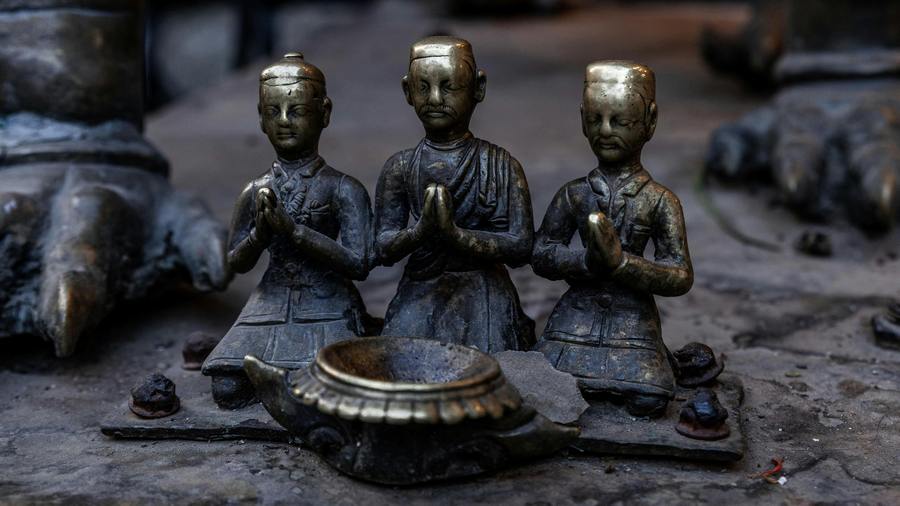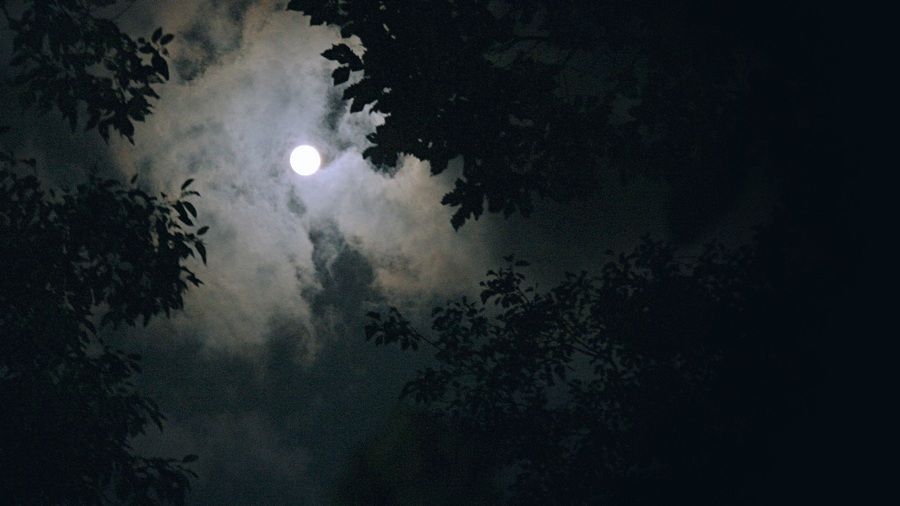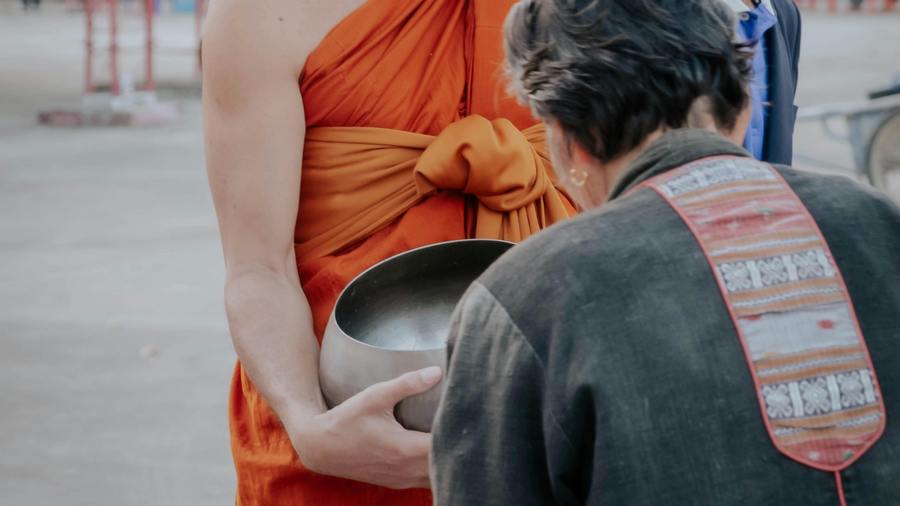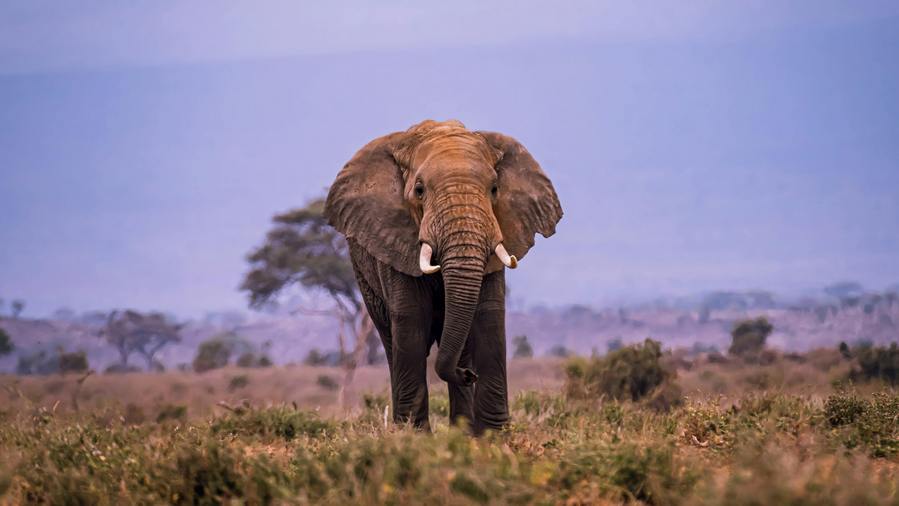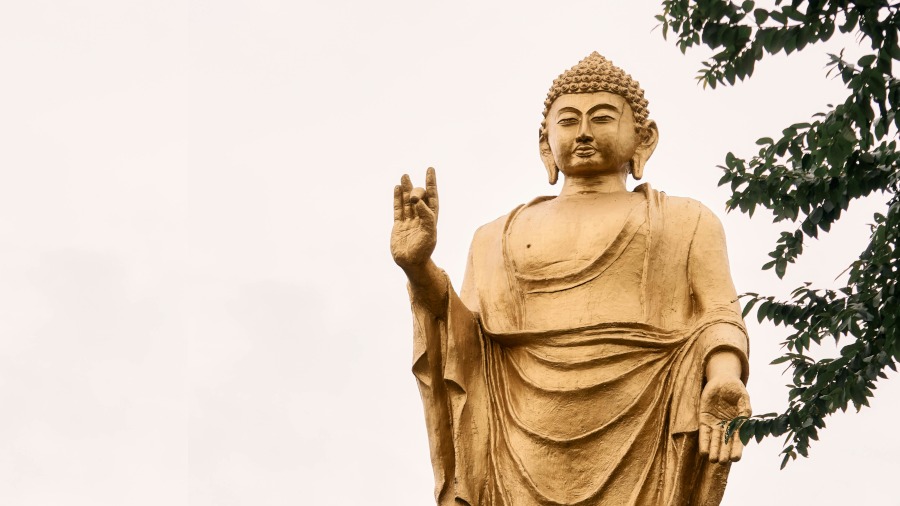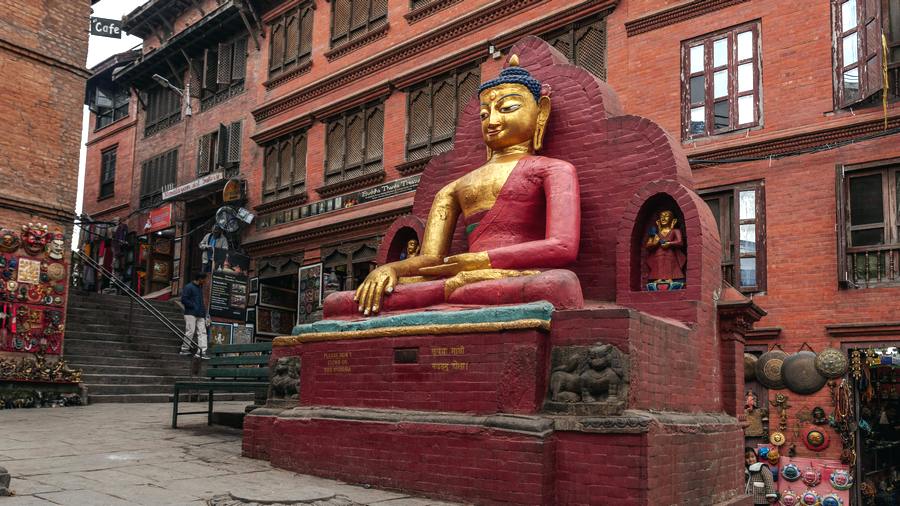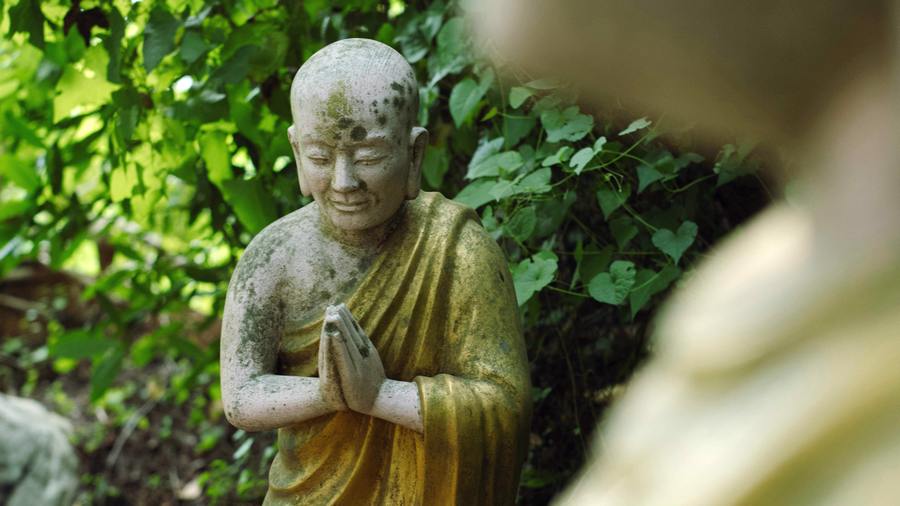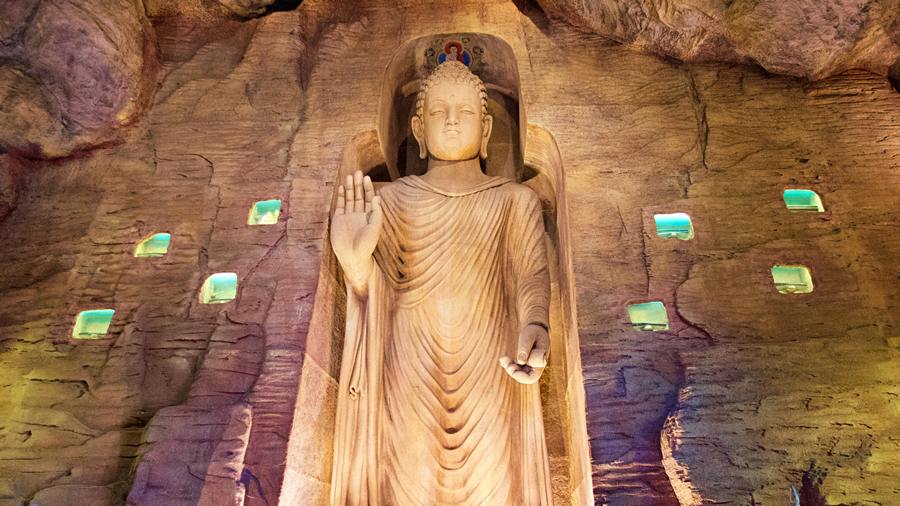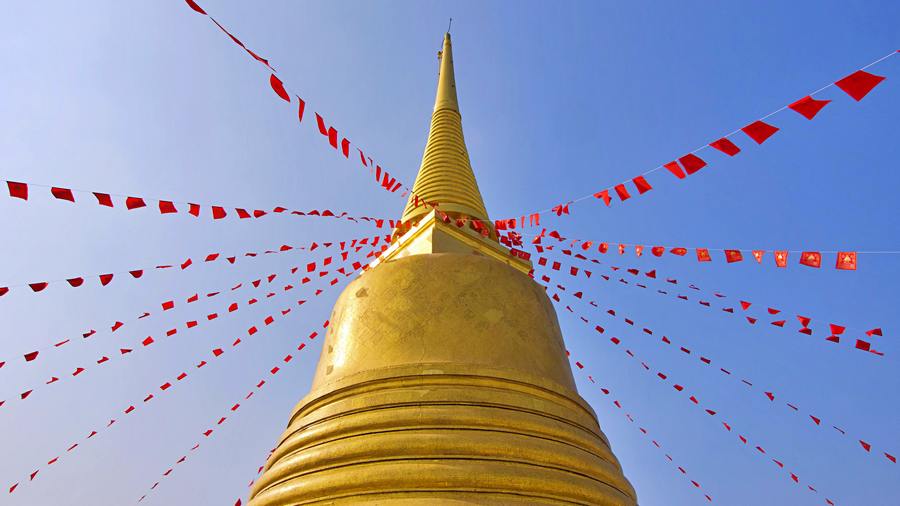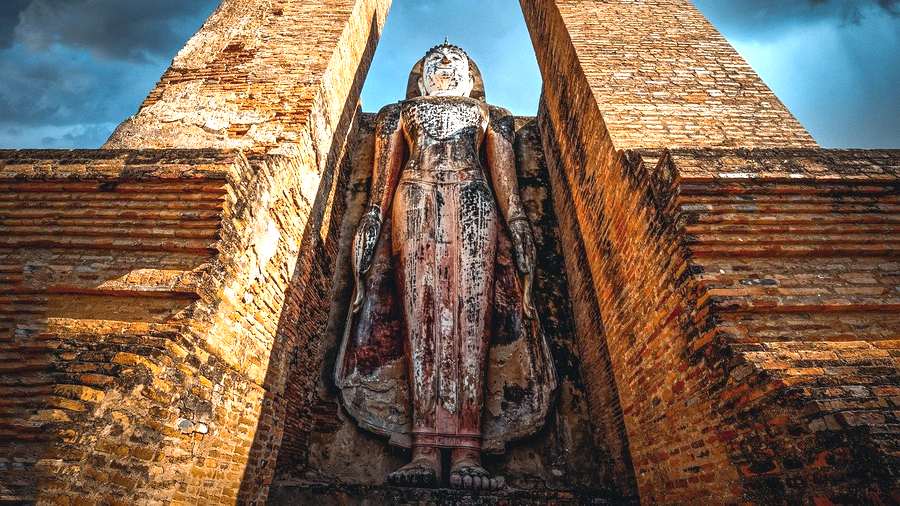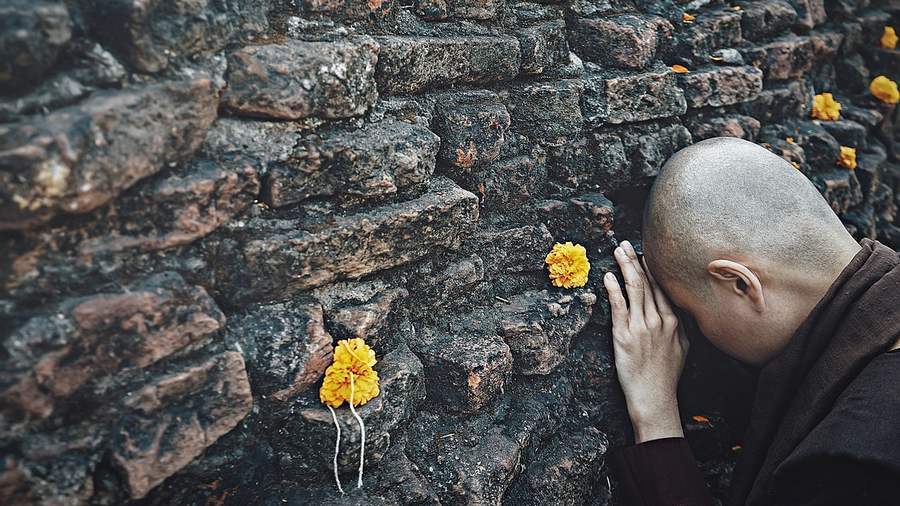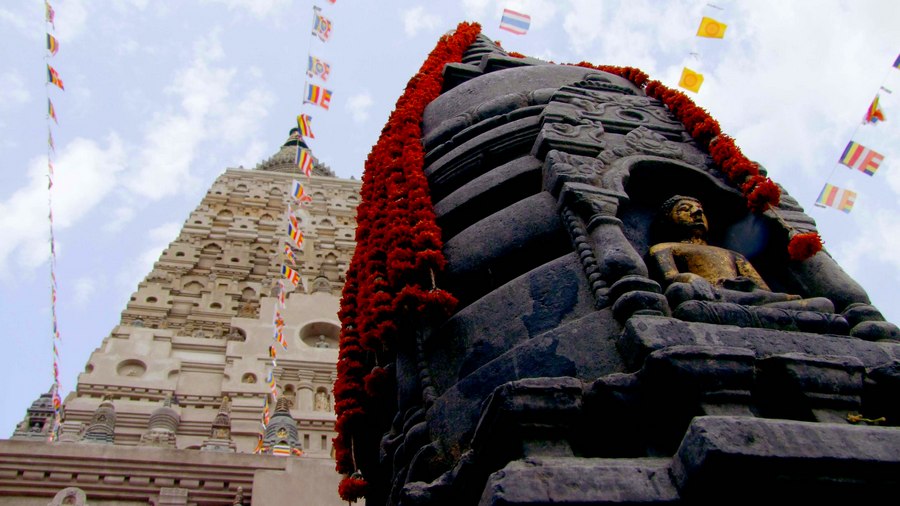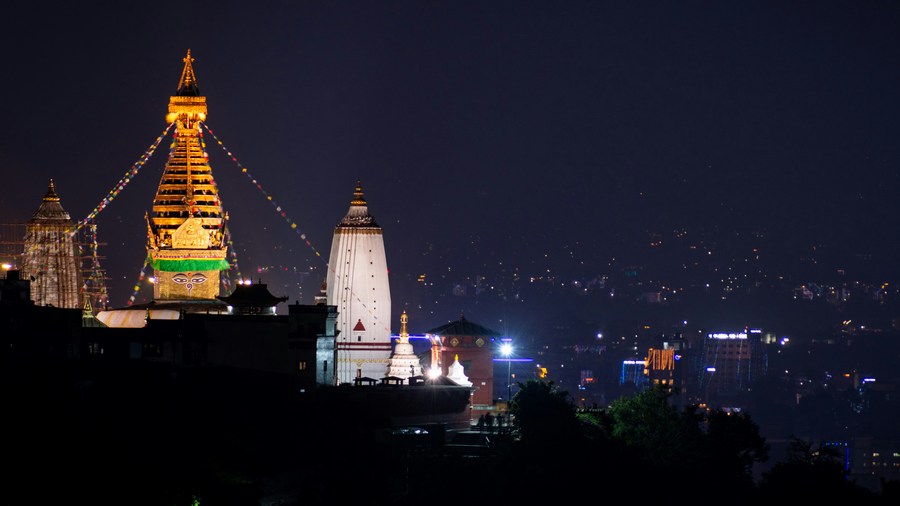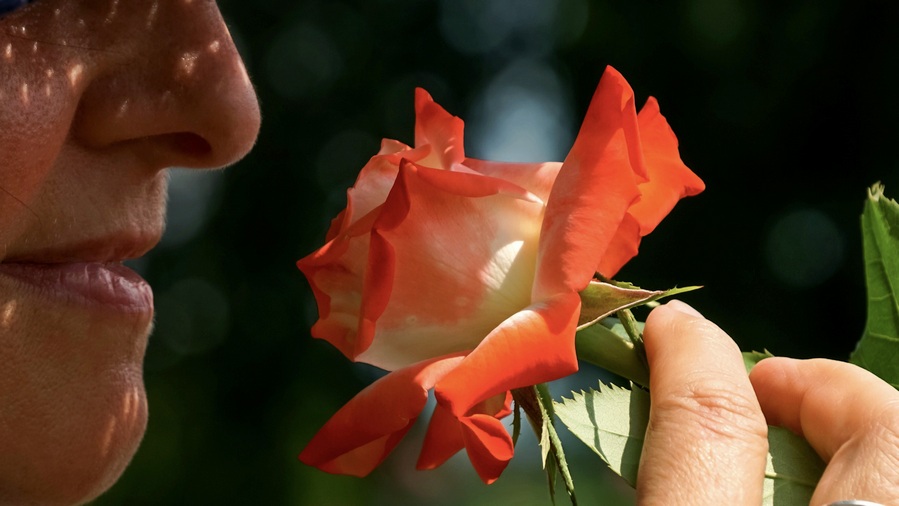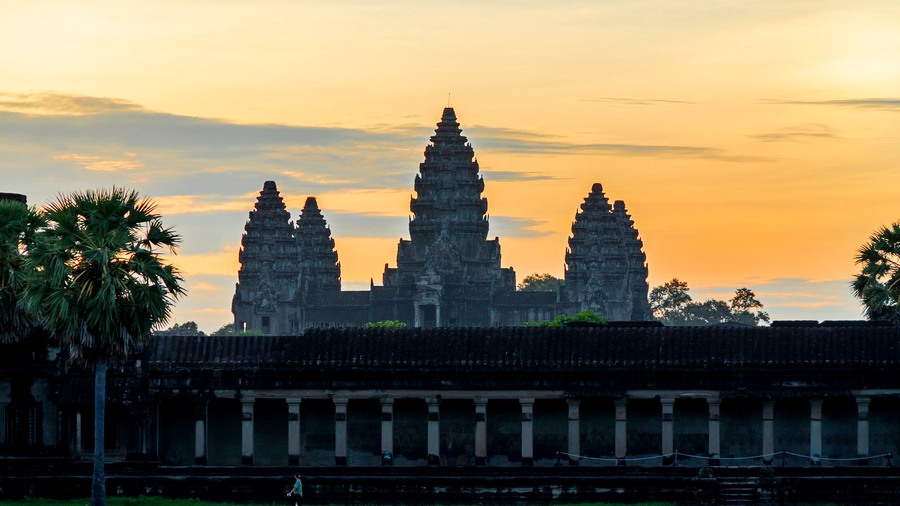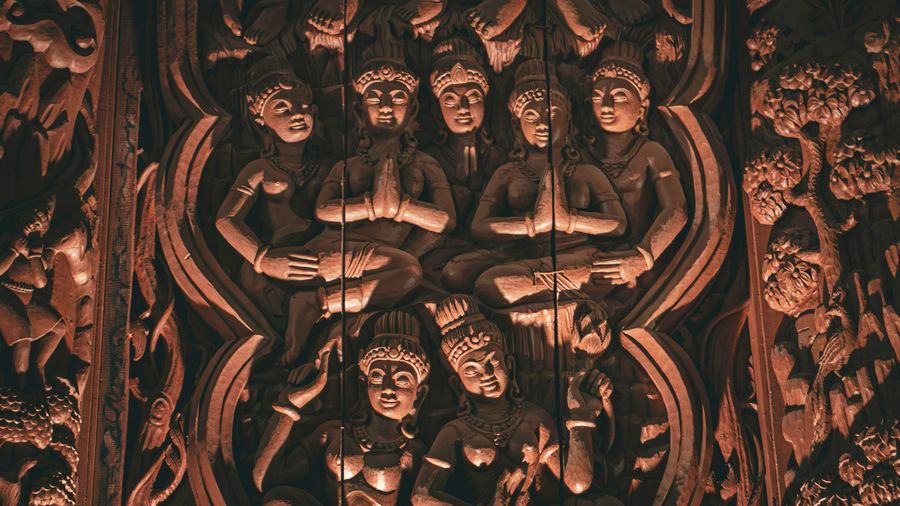[Note: This is another long selection. If you are short on time, you can just read the section headed “Ven. Mahākaccāna explains in detail“. There he gives an alternative explaination from the one given by the Buddha in MN 131 Bhaddekarattasutta. The main difference is that the Buddha explains using the aggregates and the venerable here uses the sense bases.]
At the hot springs
So I have heard. At one time the Buddha was staying near Rājagaha in the Hot Springs Monastery.
Then Venerable Samiddhi rose at the crack of dawn and went to the hot springs to bathe. When he had bathed and emerged from the water he stood in one robe drying his limbs.
Then, late at night, a glorious deity, lighting up the entire hot springs, went up to Samiddhi, stood to one side, and said to Samiddhi:
“Mendicant, do you remember the summary recital and the analysis of the one who has one fine night?”
“No, reverend, I do not. Do you?”
“I also do not. But do you remember just the verses on the one who has one fine night?”
“I do not. Do you?”
“I also do not. Learn the summary recital and the analysis of the one who has one fine night, mendicant, memorize it, and remember it. It is beneficial and relates to the fundamentals of the spiritual life.”
That’s what that deity said, before vanishing right there.
The Buddha teaches the verses
Then, when the night had passed, Samiddhi went to the Buddha, bowed, sat down to one side, and told him what had happened. Then he added:
“Sir, please teach me the summary recital and the analysis of the one who has one fine night.”
“Well then, mendicant, listen and apply your mind well, I will speak.”
“Yes, sir,” Samiddhi replied. The Buddha said this:
“Don’t run back to the past,
don’t anticipate the future.
What’s past is left behind,
the future has not arrived;
and any present phenomenon
you clearly discern in every case.
The unfaltering, the unshakable:
having known that, foster it.
Today’s the day to keenly work—
who knows, tomorrow may bring death!
For there is no bargain to be struck
with Death and his mighty horde.
One who keenly meditates like this,
tireless all night and day:
that’s who has one fine night—
so declares the peaceful sage.”
That is what the Buddha said. When he had spoken, the Holy One got up from his seat and entered his dwelling.
Soon after the Buddha left, those mendicants considered, “The Buddha gave this brief summary recital, then entered his dwelling without explaining the meaning in detail. …
Seeking out Ven. Mahākaccāna
Who can explain in detail the meaning of this brief summary given by the Buddha?”
Then those mendicants thought:
“This Venerable Mahākaccāna is praised by the Buddha and esteemed by his sensible spiritual companions. He is capable of explaining in detail the meaning of this brief summary recital given by the Buddha. Let’s go to him, and ask him about this matter.”
Then those mendicants went to Mahākaccāna, and exchanged greetings with him. When the greetings and polite conversation were over, they sat down to one side. They told him what had happened, and said:
“May Venerable Mahākaccāna please explain this.”
“Reverends, suppose there was a person in need of heartwood. And while wandering in search of heartwood he’d come across a large tree standing with heartwood. But he’d pass over the roots and trunk, imagining that the heartwood should be sought in the branches and leaves. Such is the consequence for the venerables. Though you were face to face with the Buddha, you overlooked him, imagining that you should ask me about this matter. For he is the Buddha, the one who knows and sees. He is vision, he is knowledge, he is the manifestation of principle, he is the manifestation of divinity. He is the teacher, the proclaimer, the elucidator of meaning, the bestower of freedom from death, the lord of truth, the Realized One. That was the time to approach the Buddha and ask about this matter. You should have remembered it in line with the Buddha’s answer.”
“Certainly he is the Buddha, the one who knows and sees. He is vision, he is knowledge, he is the manifestation of principle, he is the manifestation of divinity. He is the teacher, the proclaimer, the elucidator of meaning, the bestower of freedom from death, the lord of truth, the Realized One. That was the time to approach the Buddha and ask about this matter. We should have remembered it in line with the Buddha’s answer. Still, Venerable Mahākaccāna is praised by the Buddha and esteemed by his sensible spiritual companions. He is capable of explaining in detail the meaning of this brief summary recital given by the Buddha. Please explain this, if it’s no trouble.”
Ven. Mahākaccāna explains in detail
“Well then, reverends, listen and apply your mind well, I will speak.”
“Yes, reverend,” they replied. Venerable Mahākaccāna said this:
“Reverends, the Buddha gave this brief summary recital, then entered his dwelling without explaining the meaning in detail:
“Don’t run back to the past,
don’t anticipate the future.
What’s past is left behind,
the future has not arrived;
and any present phenomenon
you clearly discern in every case.
The unfaltering, the unshakable:
having known that, foster it.
Today’s the day to keenly work—
who knows, tomorrow may bring death!
For there is no bargain to be struck
with Death and his mighty horde.
One who keenly meditates like this,
tireless all night and day:
that’s who has one fine night—
so declares the peaceful sage.”
And this is how I understand the detailed meaning of this summary recital.
And how do you run back to the past? Consciousness gets tied up there with desire and lust, thinking: ‘In the past I had such eyes and such sights.’ So you take pleasure in that, and that’s when you run back to the past.
Consciousness gets tied up there with desire and lust, thinking: ‘In the past I had such ears and such sounds … such a nose and such smells … such a tongue and such tastes … such a body and such touches … such a mind and such ideas.’ So you take pleasure in that, and that’s when you run back to the past. That’s how you run back to the past.
And how do you not run back to the past? Consciousness doesn’t get tied up there with desire and lust, thinking: ‘In the past I had such eyes and such sights.’ So you don’t take pleasure in that, and that’s when you no longer run back to the past.
Consciousness doesn’t get tied up there with desire and lust, thinking: ‘In the past I had such ears and such sounds … such a nose and such smells … such a tongue and such tastes … such a body and such touches … such a mind and such ideas.’ So you don’t take pleasure in that, and that’s when you no longer run back to the past. That’s how you don’t run back to the past.
And how do you anticipate the future? The heart is set on getting what it does not have, thinking: ‘May I have such eyes and such sights in the future.’ So you take pleasure in that, and that’s when you anticipate the future. The heart is set on getting what it does not have, thinking: ‘May I have such ears and such sounds … such a nose and such smells … such a tongue and such tastes … such a body and such touches … such a mind and such ideas in the future.’ So you take pleasure in that, and that’s when you anticipate the future. That’s how you anticipate the future.
And how do you not anticipate the future? The heart is not set on getting what it does not have, thinking: ‘May I have such eyes and such sights in the future.’ So you don’t take pleasure in that, and that’s when you no longer anticipate the future. The heart is not set on getting what it does not have, thinking: ‘May I have such ears and such sounds … such a nose and such smells … such a tongue and such tastes … such a body and such touches … such a mind and such ideas in the future.’ So you don’t take pleasure in that, and that’s when you no longer anticipate the future. That’s how you don’t anticipate the future.
And how do you falter amid presently arisen phenomena? Both the eye and sights are presently arisen. If consciousness gets tied up there in the present with desire and lust, you take pleasure in that, and that’s when you falter amid presently arisen phenomena. Both the ear and sounds … nose and smells … tongue and tastes … body and touches … mind and ideas are presently arisen. If consciousness gets tied up there in the present with desire and lust, you take pleasure in that, and that’s when you falter amid presently arisen phenomena. That’s how you falter amid presently arisen phenomena.
And how do you not falter amid presently arisen phenomena? Both the eye and sights are presently arisen. If consciousness doesn’t get tied up there in the present with desire and lust, you don’t take pleasure in that, and that’s when you no longer falter amid presently arisen phenomena. Both the ear and sounds … nose and smells … tongue and tastes … body and touches … mind and ideas are presently arisen. If consciousness doesn’t get tied up there in the present with desire and lust, you don’t take pleasure in that, and that’s when you no longer falter amid presently arisen phenomena. That’s how you don’t falter amid presently arisen phenomena.
This is how I understand the detailed meaning of that brief summary recital given by the Buddha.
If you wish, you may go to the Buddha and ask him about this. You should remember it in line with the Buddha’s answer.”
The Buddha’s approval
Then those mendicants, approving and agreeing with what Mahākaccāna said, rose from their seats and went to the Buddha, bowed, sat down to one side, and told him what had happened, adding:
“Mahākaccāna clearly explained the meaning to us in this manner, with these words and phrases.”
“Mahākaccāna is astute, mendicants, he has great wisdom. If you came to me and asked this question, I would answer it in exactly the same way as Mahākaccāna. That is what it means, and that’s how you should remember it.”
That is what the Buddha said. Satisfied, the mendicants approved what the Buddha said.
Read this translation of Majjhima Nikāya 133 Mahākaccānabhaddekarattasutta: Mahākaccāna and One Fine Night by Bhikkhu Sujato on SuttaCentral.net. Or read a different translation on DhammaTalks.org. Or listen on PaliAudio.com or SC-Voice.net. Or explore the Pali on DigitalPaliReader.online.
Or read a translation in Deutsch, Русский, বাংলা, Español, Français, हिन्दी, Bahasa Indonesia, Italiano, 日本語, မြန်မာဘာသာ, Norsk, Português, සිංහල, Slovenščina, Srpski, ไทย, Tiếng Việt, or 汉语. Learn how to find your language.

 Copyright: Creative Commons Zero (CC0) To the extent possible under law, Bhikkhu Sujato has waived all copyright and related or neighboring rights to his own translations on
Copyright: Creative Commons Zero (CC0) To the extent possible under law, Bhikkhu Sujato has waived all copyright and related or neighboring rights to his own translations on 